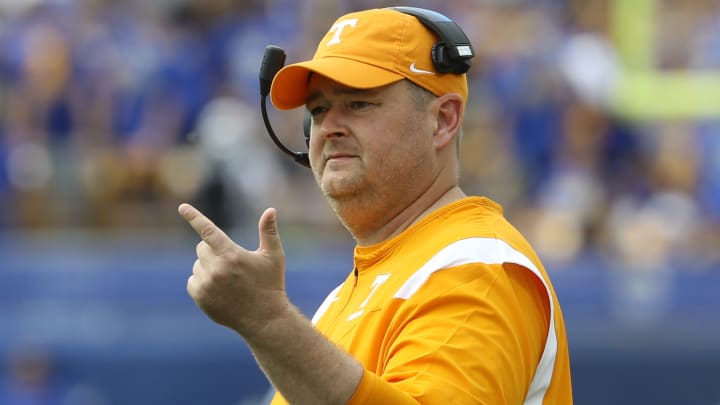Josh Heupel Hopes Tennessee Continues to Face ‘Historic Rivals’ Amid Format Talks

In this story:
The commemorative football is prominently displayed in Josh Heupel’s office.
The inscription across its face—Tennessee 52, Alabama 49—is positioned, certainly without coincidence, to face a large sectional leather couch and a table with chairs. Hard to miss, the football is a not-so-subtle reminder to those who enter—ahem, recruits—that the Volunteers took down the Crimson Tide in one of the most epic thrillers of the 2022 college football season.
“Everybody involved in our program hears about that one,” Heupel says. “There were a lot of cigars that hadn’t been lit for a long time. It does mean a lot.”
One-hundred and seventy-one days ago, the Vols upset No. 1 Alabama in Neyland Stadium to snap a 15-year losing streak against the SEC juggernaut, eliciting a cigar-smoking, goalpost-uprooting celebration not seen in Knoxville in more than a decade. The victory, a crowning achievement in Heupel’s second season at the helm, resonated across the country and helped lead Tennessee to the program’s best season (11–2) since 2001.
More than five months removed from the hysteria of that night, other reminders of it exist in this building. Before entering Heupel’s office, three giant photos from the game hang from the wall: the Vol Navy’s tailgating scene, a packed Neyland Stadium and UT players preparing to run out of the famous Power T. Some of the reminders are seared into flesh. Luke Jackson, a longtime fan, had a photo of Heupel smoking a cigar tattooed on his left thigh in the wake of the victory. He visited Heupel last week.
*Chris Collinsworth voice* Now here’s a guy who’s really happy Josh Heupel got that extension@vawldaddy #GBO 🍊 pic.twitter.com/xRBocwBZoj
— Tennessee Football (@Vol_Football) March 31, 2023
It’s all a reminder of the passion that exists in the Alabama-Tennessee series, one that has been played 105 times and every year since 1944.
The series, at least on an annual basis, could come to an end soon if the SEC elects to continue operating under a conference scheduling format of eight games when Texas and Oklahoma join the conference in 2024. Under an eight-game model administrators are considering, each team would play one permanent opponent and seven rotational ones. They are also considering a nine-game conference format with three permanent and six rotational opponents.
In an interview with Sports Illustrated, Heupel made clear he wishes to continue the series against Alabama.
“We’d love to play our historical rivals every single year,” Heupel says. “It’s important to our fan base. Players want to play those games when they come to Tennessee. I don’t know what the scheduling model is going to look like, but we want to play our historic rivals.”
The SEC’s future scheduling format has been a hotly debated topic over the past several months. The league is split on a decision, and more conversations are expected in the coming weeks leading up to its annual spring meetings in Destin, Fla.
Watch college football with fuboTV. Start your free trial today.
In an interview with SI in March, Alabama coach Nick Saban expressed his disappointment in the three permanent opponents that the conference has suggested for the Crimson Tide under a nine-game model. They are Auburn, Tennessee and LSU.
The league was expected to choose a team’s three permanent opponents based on primary and secondary rivalries, geographic footprint, and balance and parity. The conference is using a 10-year success metric to strike the fairest blend of permanent opponents for each team, Saban says.
“They said they did a 10-year whatever,” the coach says. “Well, some of those years, Tennessee wasn’t as good as they’ve been in the previous 10 years, but now they are as good as they used to be before that 10 years.
“We got three teams, and two of them are in the top 10, and the other is in the top 10 a lot,” Saban continues. “Look historically over a 25-year history, the three best teams in the East are Georgia, Tennessee and Florida. You look historically at 25 years, Alabama, LSU and Auburn are the three best teams in the West. So we’re playing them all.”
While he has been a vocal supporter of playing more league games, Saban says the eight-game model would allow the SEC to achieve a more balanced scheduling format. However, secondary rivalries will be lost on an annual basis, such as Alabama-Tennessee, Auburn-Georgia and the revival of Texas–Texas A&M.
Heupel declined to say what format he prefers but emphasized the importance of the Alabama rivalry.
“Football brings people together. Such a proud tradition,” he says. “That game, we’re unique in that we have a lot of different rivals … that, for certain, for the older generation, is the game.”
Tennessee’s victory against Alabama and 11–2 season in general “opened doors” to recruiting, Heupel says.
“When we got here, we were talking about who we were and what it was going to look like. Now you have tangible proof that this is a program that can and will compete with the best in the country,” Heupel says.
“It creates a narrative, which is real—we’ve grown really quickly, and this is a program that’s going to recruit and develop at an elite level, and kids are going to have a lot of fun.”

Ross Dellenger received his Bachelor of Arts in Communication with a concentration in Journalism December 2006. Dellenger, a native of Morgan City, La., currently resides in Washington D.C. He serves as a Senior Writer covering national college football for Sports Illustrated.